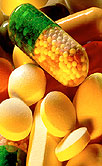
WEDNESDAY, Dec. 15 (HealthDay News) — U.S. health authorities Wednesday intensified pressure on makers of dietary supplements, warning individuals or companies marketing “tainted” products that they could face criminal prosecution, among other consequences.
The move comes after several reports of injury and even death from the use of illegal supplements that are deceptively labeled or contain undeclared ingredients. These include those laced with the same active ingredients as drugs already approved by the U.S. Food and Drug Administration, analogs (close copies) of those drugs or novel synthetic steroids that don’t qualify as dietary ingredients.
“Some contain prescription drugs or analogs never tested in humans and the results can be tragic,” said Dr. Joshua Sharfstein, principal deputy commissioner at the FDA, at a Wednesday news conference. “We have received reports of serious adverse events and injuries associated with consumer use of these tainted products, including stroke, liver and kidney damage, pulmonary failure and death.”
Since 2007, he added, FDA has issued alerts on 300 tainted products.
“FDA is calling attention to an important public health problem,” Sharfstein said. “Serious injuries have resulted from products masquerading as dietary supplements. . . They’re usually poorly labeled so consumers don’t know what they’re buying.”
Most of the illegal products are marketed in three categories: to promote weight loss, to enhance sexual prowess and as body-building products, the agency noted.
The weight-loss products identified with problems include Slimming Beauty, Solo Slim and Slim-30, which contain sibutramine (or analogs), the active ingredient in the FDA-approved drug Merida, recently withdrawn from pharmacy shelves due to a heightened risk of heart attack and stroke.
The body-building products include Tren Xtreme, ArimaDex and Clomed, which contain anabolic steroids or aromatase inhibitors, a class of cancer-fighting drugs that interfere with estrogen production. Consumers should also be aware of “products that provide warnings about testing positive in performance drug tests,” Sharfstein said.
The sexual-enhancement products tend to include the active ingredient or an analog of the popular approved erectile-dysfunction drugs Viagra, Cialis and Levitra. Illegal products include Vigor-25, Duro Extend Capsules for Men and Magic Power Coffee. In particular, sexual enhancement products promising rapid effects in minutes to hours or long-lasting effects of 24 to 72 hours, should be viewed with caution, the agency warned.
Consumers should also be skeptical of products that claim to be alternatives to or similar to FDA-approved drugs; those that say they are a legal alternative to anabolic steroids; and those marketed primarily in foreign languages and through mass e-mails, officials cautioned.
FDA is launching a new RSS feed, which is a Web-based service, so consumers can keep abreast of rapidly changing developments regarding tainted supplements and other products.
The agency is also introducing a new way for industry to refer suspects, including referring them anonymously, Sharfstein said.
Representatives from five trade associations representing the dietary supplement industry — the Council for Responsible Nutrition, Natural Products Association, United Natural Products Alliance, Consumer Healthcare Products Association and American Herbal Products Association — also spoke at the news conference pledging their support, including help putting out the word within the industry.
“We want to drive these pirates out of our industry to protect the public health and safety of millions of consumers who do rely on these products for daily health needs,” said Loren Israelsen, executive director of the United Natural Products Alliance.
“We have been astonished at the unfortunate growth of this particular class of products, which are intentionally spiked,” Israelsen added. “These are illegal products marketed by people who work in the shadows. They are difficult to find but we are committed to working with FDA to find them and drive them out of our industry and out of the U.S.”
Legitimate dietary supplements are regulated under the Dietary Supplement Health and Education Act of 1994. They do not have to be approved by the FDA before reaching consumers, but manufacturers are expected to ensure standards.
More information
The FDA has more about dietary supplements.

